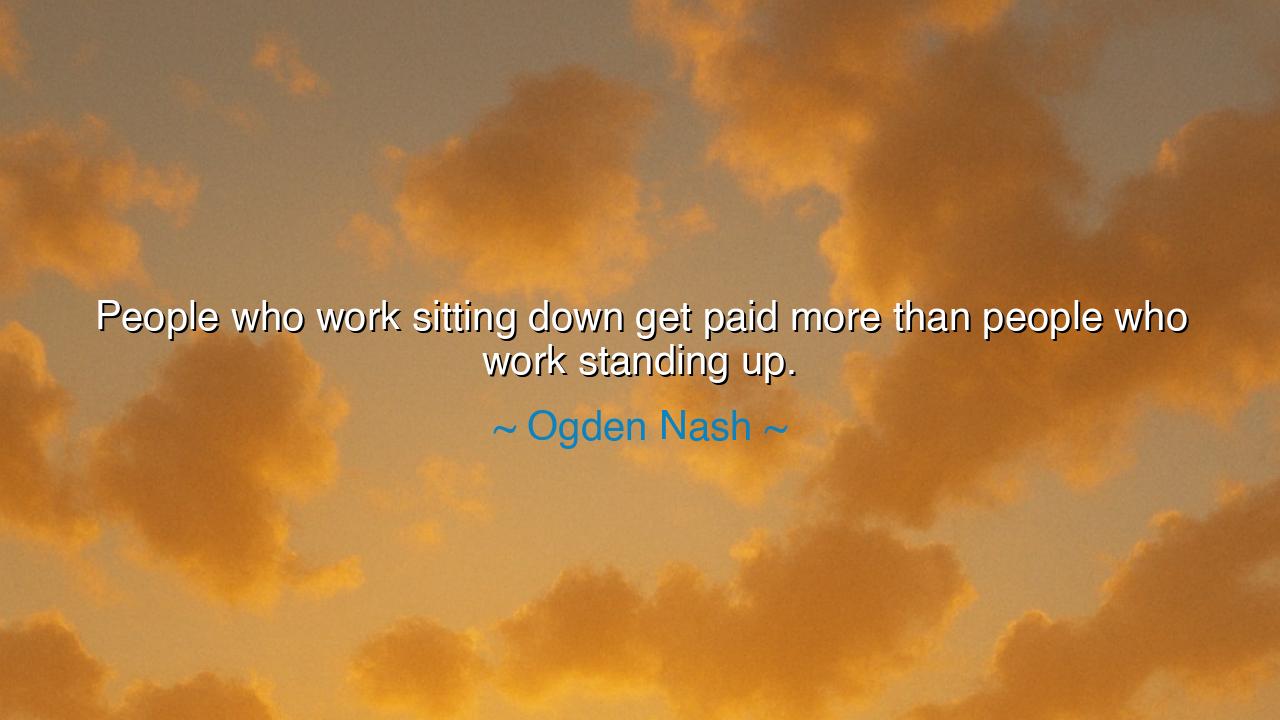
People who work sitting down get paid more than people who work






In the clever words of Ogden Nash, “People who work sitting down get paid more than people who work standing up,” there lies a sharp observation about the ways of society and its unequal rewards. At first, it seems like a simple jest, but within it dwells a deeper truth: that wealth and honor are not always granted to those who labor the hardest with their hands and bodies. Those who sit, directing, planning, or speaking, are often given riches and respect, while those who stand, toiling with strength and sweat, are left with meager rewards.
The origin of this truth reaches back to the dawn of civilization, when kings sat upon thrones while farmers bent beneath the sun and soldiers marched upon weary feet. In every age, there has been a division between the rulers and the ruled, the thinkers and the doers. Nash’s words, though spoken with humor, carry the weight of this ancient imbalance, revealing how society often values the mind’s command over the body’s labor, even though both are necessary for the world to thrive.
To work sitting down is often to dwell in comfort and authority, while to work standing up is to face hardship and exhaustion. Yet without those who stand, no field would be tilled, no building raised, no city sustained. The irony, as Nash shows, is that those who bear the greatest burdens often receive the least reward. This truth stirs both laughter and sorrow, for it reflects the enduring injustice woven into the fabric of human communities.
Thus, these words are not merely a witty remark but a mirror held up to society. Let them serve as a lesson to future generations: do not mistake wealth for worth, nor comfort for greater virtue. A wise and just people must honor both the thinker and the laborer, remembering that no throne can stand without the hands that built it. In this balance lies the hope of a world where all who work, whether sitting or standing, may be given the dignity they deserve.






NVhuynh nhat vy
Ogden Nash’s remark offers an ironic perspective on societal views of labor and compensation. Do you think the divide between sitting-down and standing-up jobs reflects a deeper societal preference for intellectual over physical labor? How do you feel about the fact that people doing physically demanding jobs often earn less, despite contributing so much to society’s functioning? How can we change the way we value different types of work in the modern world?
PMPham My
Nash’s quote seems to poke fun at how work and compensation are often detached from the effort involved. The notion that ‘sitting down’ work is valued more than physical labor raises questions about how we measure productivity. Is it time to rethink how we define ‘valuable work’ in society? Should there be a greater recognition of the hard work done by people in physically demanding jobs, even if they don’t require a desk or office space?
LTLong Tran
This quote by Ogden Nash brings to light the value of physical labor versus intellectual labor. Is it fair to assume that those working at desks deserve higher pay simply because they aren’t physically active? What does it say about our values when physical work—such as construction, factory, or service jobs—is often underpaid? Should there be a shift in how we view different types of work in terms of compensation and societal worth?
NQNhi Quynh
Ogden Nash’s playful take on work might be seen as a critique of the ways society prioritizes comfort over effort. While desk jobs are often higher-paying, they don’t always reflect the hard work of those who perform physically demanding roles. Do you think the pay disparity between sitting jobs and standing jobs is justified? Should physical labor be compensated more fairly, or do you believe it’s more about the skills required for the job?
RRobloxScreenShot20190504_013757637
Nash’s quote highlights an interesting contradiction in how we value different kinds of work. Is it fair that jobs requiring physical labor are often underpaid compared to desk jobs, even though they are crucial to society? Do you think this gap in compensation reflects an outdated perspective, or does it still hold true today? How do we change this dynamic to ensure all work is equally valued, regardless of whether you’re sitting or standing?